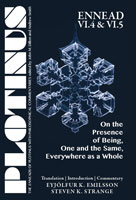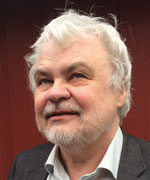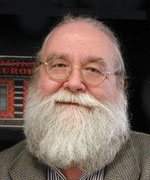
 |
PLOTINUS Ennead VI.4 & VI.5:
On the Presence of Being,
One and the Same,
Everywhere as a Whole
Translation, with an Introduction, and Commentary
THE ENNEADS OF PLOTINUS
—WITH PHILOSOPHICAL COMMENTARIES
Series Edited by
John M. Dillon and Andrew Smith
January 2015
9781930972346
305 pages 5 x 7.5 Paperback
$37.00
|
|

Eyjólfur K. Emilsson
is Professor of Ancient Philosophy at the University of Oslo. He is the author of Plotinus on Sense-Perception: A Philosophical Study (Cambridge University Press, 1988), and Plotinus on Intellect (Oxford University Press, 2007). |
|

Steven K. Strange
was Associate Professor of Philosophy at Emory University until his untimely death in 2009. He is the author of the authoritative translation of Porphyrys On Aristotle, Categories (Duckworth and Cornell University Press, 1992), and co-editor of Stoicism: Traditions and Transformations (Cambridge University Press, 2004). |
|
|
|
Ennead VI.4–5, originally written as a single treatise, contains Plotinus’ most general and sustained exposition of the relationship between the intelligible and sensible realms, addressing and coalescing two central issues in Platonism: the nature of the soul–body relationship and the nature of participation. Its main question is, How can soul animate bodies without sharing in their extension? The treatise seems to have had considerable impact: it is much reflected in Porphyry’s important work, Sententiae, and the doctrine of reception according to the capacity of the recipient, for which this treatise is the main source, resonated in medieval thinkers.
Plotinus was a Platonist, committed to expounding the doctrines put forward by Plato some seven centuries earlier. He was born and educated in Egypt, where he studied the teachings of Plato under the guidance of Ammonius Saccas. He came to Rome in 244 CE and built up a circle of followers devoted to studying Plato through Plato's own works and those of philosophers, both Platonist and non-Platonist, of the intervening centuries. From his fiftieth year Plotinus himself wrote down, in Greek, the findings of the seminars, and these writings were later edited by one of his pupils, Porphyry, and published in six groups of nine treatises entitled the Enneads (from the Greek word for nine – ennea).
|
|
 |
Steven Strange did a first translation of this extremely rich portion of the Enneads before his untimely death, which Eyj?lfur Emilsson - benefiting from Christian Tornau’s German commentary on the same section – was able to bring to completion. As a platform for Plotinus’ view of philosophy as a return back up the scale of being towards union with the transcendent One, this shows the strengths, but also the weakness offered by Plotinus’ attempted systematization of Greek philosophy coming to him primarily from the Platonic tradition.
(Read the entire review here) |
—Patrick Madigan
Heythrop College |
|
 |
This new English translation of, and commentary on, Plotinus, Ennead VI.4-5, the joint achievement of the Plotinian scholars Eyjólfur K. Emilsson and Steven K. Strange, combines philological rigor with philosophical insight. An introduction and a synopsis help the readers on their way. As the title, On the Presence of Being, One and the Same, Everywhere as a Whole, indicates, Plotinus here explores the question of how intelligible being remains the same and whole, and the participation of the dispersed bodies in it does not render it divided. His ingenious solution to this problem, raised in Parmenides 131b-c, is that the participation of the sensible in the intelligible does not amount to the spatio- temporal presence of the intelligible in the sensible realm.
(Read the entire review here) |
—Sui Han, Beijing
Bryn Mawr Classical Review |
|
“. . . [N]oteworthy for its nuanced treatment of Plotinus’ treatise according to the best methods of analytic philosophy and classical philology. The incisive notes guide the reader into issues that are of fundamental philosophical importance concerning the relationship of soul to the physical world and to the body. The authors illuminate Plotinus’ often abstruse writing by clarifying the underlying arguments in light of the previous philosophical tradition.”
|
—Sara Ahbel-Rappe
Professor of Greek & Latin
University of Michigan |
|
“These two treatises show Plotinus at his philosophical best, deepening the intricacies of the problems, proposing new solutions, and exploring different perspectives on the problems. Emilsson and Strange give us access to Plotinus’ philosophical mind at work, thanks to their clear and accurate translation, which is accompanied by a helpful and thoughtful commentary.”
|
—Dominic O’Meara
Emeritus Professor of Philosophy
University of Fribourg |
|
“A stellar contribution to Plotinus studies. . . . [T]he translation of Plotinus’ Greek text is precise, accurate, and helpful.”
|
—Michael Wagner
Professor of Philosophy
University of San Diego |
|
| “A lucid translation that makes clear the argumentative structure of Plotinus’ work . . . This volume will, of course, be a valuable addition to the library of anyone working on late antique Platonism. Beyond that, however, Ennead VI.4 and VI.5 should provide a valuable occasion for reflection for contemporary philosophers.” |
—Dirk Baltzly
Associate Professor of Philosophy
Monash University |
|
“The commentary . . . is a paradigm of lucidity, completeness, and clarity. It makes the treatises accessible to the reader who is approaching Plotinus for the first time, while offering interpretations, clarifications, and insights that will interest and challenge the specialist.” |
—Cinzia Arruzza
Associate Professor of Philosophy
New School of Social Research |
|
“. . . [E]verything that a great commentary should be. . . . The introduction and notes are historically informed and philosophically astute . . . an excellent guide through one of Plotinus’ most challenging treatises.”
|
—Dr. Christopher Noble
Lehrstuhl für Philosophie VI
LMU-München |
|
“[T]he result of a collaborative effort between two of the most distinguished interpreters of Plotinus . . . expertly guide us through this complex text, which offers valuable insights into ancient as well as contemporary discussions on the body-soul problem.” |
—Dr. Panayiota Vassilopoulou
Dept. of Philosophy
University of Liverpool |
|
|
|
|
|

